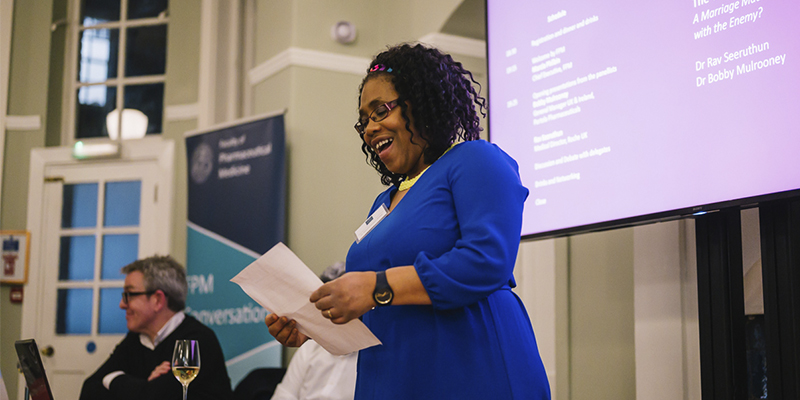Dr Marcia Philbin is the chief executive of the Faculty of Pharmaceutical Medicine, the membership body for doctors involved in medicine development, advancing the science and practice of pharmaceutical medicine for the benefit of the public. Marcia started her work life by conducting research in chemistry, becoming a Chartered Chemist, before moving into management roles. She is also a Fellow of the Royal Society of Chemistry and a member of the Association for Project Management.
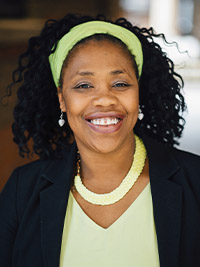
“Diversity of thought is so important in pharmaceutical medicine because when medicines and medical devices are developed for whole populations, it must be for the whole population and not just for a segment based on who was included in a clinical trial.”
Proving them wrong
My educational background is interesting. I missed most of the last two years of primary school due to a leg disability that required me to have five surgeries. I had to learn how to walk again twice in those two years.
So, by the time I went to a comprehensive secondary school, teachers did not know my ability and I was put into the bottom set. By the end of the year, I was moved to a top set after I came top in most of my exams.
I did not have a positive experience when it came to obtaining career advice from teachers when I was doing my O-levels. I was told by a teacher who had never taught me that I was ridiculous to think that I could go to university, let alone pass my O-levels. My English teacher also tried to force me to do take CSE English rather than O-level, but my parents talked to her. In the end, I received eight O-levels and the school gave me a prize for ‘most endeavoured’.
Flourishing in chemistry
I went to Matthew Boulton Further Education College for my A-levels because I wanted to get away from the unsupportive teachers at school. There, I thrived and that is when I realised how good I was at chemistry. Even so, like many of my classmates, I applied to do medicine.
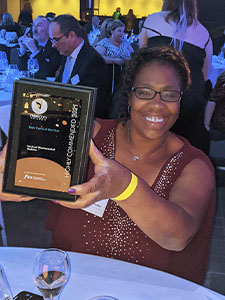
Following my PhD, I went to work for an agency of the Ministry of Defence. My first research project was on investigating how to incorporate energy into a polymer in order to make a new type of explosive material.
I then moved on to researching polymer binders for rocket propellants before successfully receiving a grant for £750k for my own project to develop multi-functional polymers. This was wonderful because I was responsible for funding five PhD students at various universities as well as two post-doctoral researchers.
From research to management
I came to the attention of a senior leader who decided to pluck me out of the laboratory to appoint me as a business group manager for 50 scientists and engineers. I then went on to other roles, such as business development manager.
After my twins were born in 2004, I took a step back as a systems engineer and worked part-time for three days a week on various programmes like the Soldier Modernisation Programme.
In 2009, I was made redundant from QinetiQ, so I joined the Defence Science and Technology Laboratory where I returned to work full-time to manage a multi-million programme that involved visiting Afghanistan.
In 2016, I was recruited to The Royal College of Paediatrics and Child Health as the assistant director for research and policy. This was completely different to what I had been doing before but my transferable skills were applicable and that is how I was able to move from defence to health.
Three years later, I happened upon a job advert for a new chief executive at the Faculty of Pharmaceutical Medicine and applied. To my amazement, I was appointed to the role and I have not looked back!
Leading a membership organisation
The Faculty of Pharmaceutical Medicine (FPM) is the membership body for doctors involved in medicine development. I am responsible for leading the staff, managing the board of trustees and supporting our members in their profession.
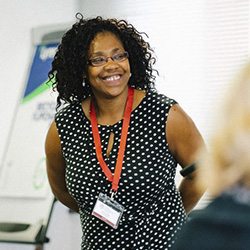
Continuing to provide a seamless and professional service to our members
COVID-19 has dominated FPM’s activities since the beginning of 2020, and as CEO I have led the staff group to ensure that FPM continued to deliver a seamless and professional service to members during the 18 months we were working entirely at home.
We invested in digital tools and platforms to enable business operations, meetings, training, events and other activities to continue. New policies for working from home, online etiquette and staff well-being have been introduced and all staff have taken up the offer of flexible working where they can work from home two days per week.
Prior to the pandemic, FPM did not deliver any work online with exception of our social media accounts. Now, we are delivering training, education, events, seminars and our annual symposium online. During lockdown, I recruited two full-time members of staff and two Kickstart trainees.
Personally, I was approached to be on the editorial board of the National Health Executive publication and my first publication was to introduce pharmaceutical medicine to a wider audience.
COVID-19 has provided an opportunity and permission to try new things and not be afraid of failure. It is paying off in terms of the skills that the staff have acquired, the increased profile of FPM and the understanding of the importance of pharmaceutical medicine.
Medicines are not just for some of us
Diversity of thought is so important in pharmaceutical medicine because when medicines and medical devices are developed for whole populations, it must be for the whole population and not just for a segment based on who was included in a clinical trial.
Diversity of thought will challenge the status quo, lead to creative solutions, push others outside of their comfort zone but most importantly, bring in those who for too long have been excluded and marginalised.
I touched on this in an article I wrote: Vaccine Hesitancy in Black, Asian and Minority groups – it is a matter of trust.
Championing inclusion
For the first time in 2019, FPM celebrated Black History Month and held two fireside chats which attracted a large audience. I wrote my reflections on the key learnings in a blog called Ten lessons from FPM’s Black History Month webinars.
We also commissioned one of the speakers, who is also a published poet, to write a poem on the COVID-19 crisis, Humanity in Calamity, by Dr JFW Ndikum.
In 2020, we launched a project called Women in Pharmaceutical Medicine to determine how women’s careers are affected in the pharmaceutical industry.

We also launched the new EDI Forum earlier in 2021 and the outputs have been incredible, including a video on how to talk about where someone is from, Where are you from?.
We recently published a blog from a member of the EDI Forum on her experience of leaving clinical medicine and moving into pharmaceutical medicine, Out of the MDT* and into the CVT**: 5 things I wish I knew when moving into Pharmaceutical Medicine.
We are currently holding a webinar series in conjunction with the Medical Women’s Federation on menopause and how it affects women from all backgrounds, including ethnicity, sexual orientation, and those who are now transmen.
Sharing stories of Black people who have been overshadowed
Black History Month should not exist but we do not live in the ideal world. Without BHM, we would not know about the extensive contribution that Black people have made to society.
Too often the narrative is one of negativity, of passive victims or stereotypical sport or pop stars. Black people come from diverse backgrounds and are individuals who do not represent the entire Black race.
I recently wrote a LinkedIn post about a poor African-American woman who has saved millions of lives.
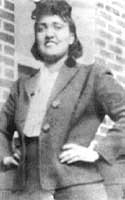
Her name is Henrietta Lacks and she died from cervical cancer in 1951. Unbeknown to her, tissue was removed from her by a doctor and her cells were later reproduced in a lab following her death. Those cells are known as HeLa cells and are responsible for the development of many medicines and vaccines that have saved millions of lives.
So, many scientists have worked with these cells but did not know about the person behind them. What is even more shocking, is that her family did not know until the 1980s. These things need to be told so that the historical exploitation of Black people is exposed and the trauma that these wrongs stir can be remedied.
Hidden figures of the NHS
I recently wrote a blog post about my mother and the other Hidden Figures of the NHS. The women who came from the Caribbean were the backbone of the NHS and endured indignities from the very people they were helping and that is why my role models are those women, including my mother. They endured indignities so that their children could have a better life. I am here because of women like them.
Pause, reflect and reset
In my personal life, I am looking forward to finding out which universities my twin sons will be accepted into as they are currently studying for their A-levels.
My husband and I have birthday’s one day apart so looking forward to our celebrations with our sons. I am also looking forward to Christmas to see family who we missed last year as well as to pause, reflect and reset.
Professionally, I am excited about the period of transition in FPM. We have a new president who will take up the post in November.
I am developing FPM’s new strategy for 2023-2025 and I am looking forward to our forthcoming Annual Symposium, which includes speakers such as Dr Özlem Türeci, who was one of the brains behind the Pfizer-BioNTech vaccine, and Professor Jonathan Van-Tam, the deputy chief medical officer, who is now well known by the public for his double act with Professor Chris Whitty or Sir Patrick Vallance.
You see, I am a mother and wife first, CEO second. That is how I achieve my balance in life.
https://www.linkedin.com/in/marcia-philbin-21475910/
https://twitter.com/FacultyPharmMed
https://www.linkedin.com/company/faculty-of-pharmaceutical-medicine/
https://www.rsc.org/membership-and-community/member-stories/marcia-philbin/

